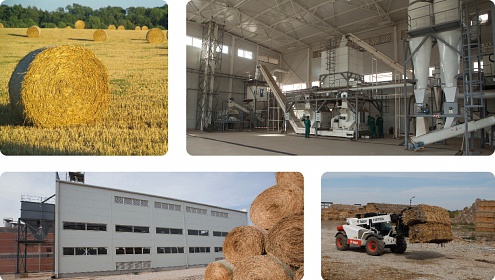BIOMASS

Due to the limited reserves of fossil fuels and pollution of the environment as the result of their use, there is an increasing focus on renewable energy sources, while the use of biomass is especially promoted for the production of heat and electrical energy and bio fuels. Renewability, significantly lower negative ecological influence, significant energy potential, and almost equal quality of produced energy in comparison to fossil fuels, are the characteristics due to which biomass represents the fuel of the future.
In Serbia, biomass is mostly found in the area of Vojvodina, but its use is modest (around 2%) due to the problems of “biomass logistics”. Under this term, the collection, transport, storage, and use of biomass as an energy source in a relatively narrow radius are understood. Victoria Group is currently the only system in Serbia which can adequately respond to the aforementioned challenges, and manages large quantities of biomass thanks to its network of long-time partners, purchase of straw, and organisation of storage in the company system, the use of advantages of its own logistics structure and investing into the pelleting plant. As part of the Victoria Group system, Victoria Logistics, with its logistics network (12 silos in its ownership, a port on the Danube, transport and handling) has all the preconditions for the efficient collection and management of biomass in the area of Vojvodina.
A small energetic density of agricultural biomass, high moisture content, as well as the heterogenity of shape and size, influence the complexity of these operations. This is why, apart from a strong logistics infrastructure, appropriate preparation of biomass prior to its exploitation is necessary. Therefore, the usage of biomass in form of pellets is ideal. Due to the production process, pellets have high energetic density, low moisture content and homogenity. Biomass pellets are suitable as a fuel type for the broadest application, from the furnaces and fireplaces to large energetic plants.
Victoria Starch, the youngest member company from the Victoria Group business system, began continuous production of agro-pellets, i.e. pellets from agricultural biomass, in mid-2013.
Agro-pellets are a cylindrical, smooth and odorless products obtained by pressing biomass – crop residue (soybean, wheat and rapeseed straw) under high pressure, without adding any binding agents. In this way the sustainable use of agricultural biomass as a renewable energy source is achieved.
Agro-pellets have two main uses: for burning in boilers and as litter for breeding animals. Accordingly, Victoria Starch put two new products on the market available in 15kg, 25kg and 1t packages and in bulk.
Energy pellets are agro-pellets from crop residue with a minimum soybean straw content of 50%. Pellets are a cost-effective and environmentally-friendly energy source intended for a wide variety of purposes. They can be used in all agro-pellet-fueled furnaces in households and public institutions, as well as pellet-fueled furnaces with mechanical grille cleaning. Pellet burning generates the same amount of CO2 that the biomass utilized during its “growth”, which is why pellets are considered a CO2-neutral energy source. They contain no sulfur, so there is no sulfur oxide emission. They are also considered to be a highly efficient fuel in solid fuel boilers.
Pellets for animal litter are made of wheat straw. As a completely natural, high hygienic value product, pellets are the best choice for animal litter. They are suitable for breeding chicks, egg laying hens, turkeys, and they are also great for horses and other animals. Pellets are manufactured at 920C, which guarantees complete microbiological safety of the product. The absorption power of pellets is nine times greater than that of straw, which provides more comfort for animals and enables them to remain on dry ground. Better breeding conditions thanks to the high absorption power of pellets result in the better yield and lower mortality rate of poultry. In addition, the use of pellets as litter has a number of additional benefits, such as: the elimination of odors in breeding facilities, easier and faster cleaning of facilities, and a decrease in the amount of waste, which can be used as fertilizer more easily and efficiently.
For additional information please contact:
VICTORIA STARCH
23000 Zrenjanin, Serbia
Petra Drapšina 1
Tel: +381 23 3155 050
fax: +381 23 522 805, +381 23 525 082

